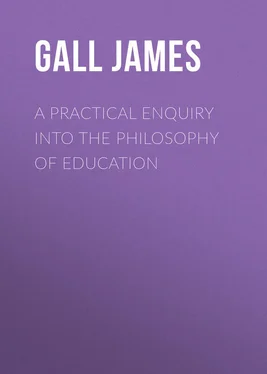James Gall - A Practical Enquiry into the Philosophy of Education
Здесь есть возможность читать онлайн «James Gall - A Practical Enquiry into the Philosophy of Education» — ознакомительный отрывок электронной книги совершенно бесплатно, а после прочтения отрывка купить полную версию. В некоторых случаях можно слушать аудио, скачать через торрент в формате fb2 и присутствует краткое содержание. Жанр: foreign_detective, foreign_antique, foreign_prose, на английском языке. Описание произведения, (предисловие) а так же отзывы посетителей доступны на портале библиотеки ЛибКат.
- Название:A Practical Enquiry into the Philosophy of Education
- Автор:
- Жанр:
- Год:неизвестен
- ISBN:нет данных
- Рейтинг книги:3 / 5. Голосов: 1
-
Избранное:Добавить в избранное
- Отзывы:
-
Ваша оценка:
- 60
- 1
- 2
- 3
- 4
- 5
A Practical Enquiry into the Philosophy of Education: краткое содержание, описание и аннотация
Предлагаем к чтению аннотацию, описание, краткое содержание или предисловие (зависит от того, что написал сам автор книги «A Practical Enquiry into the Philosophy of Education»). Если вы не нашли необходимую информацию о книге — напишите в комментариях, мы постараемся отыскать её.
A Practical Enquiry into the Philosophy of Education — читать онлайн ознакомительный отрывок
Ниже представлен текст книги, разбитый по страницам. Система сохранения места последней прочитанной страницы, позволяет с удобством читать онлайн бесплатно книгу «A Practical Enquiry into the Philosophy of Education», без необходимости каждый раз заново искать на чём Вы остановились. Поставьте закладку, и сможете в любой момент перейти на страницу, на которой закончили чтение.
Интервал:
Закладка:
In education, as in the other sciences, Nature is our only sure teacher; and the Educationist, therefore, who desires success, must proceed in the investigation in a similar way. He must first take a comprehensive view of Nature's educational processes; divide them into their several kinds; and subdivide these again when necessary, that each may be viewed alone. He must then ascertain the nature and the object of these processes, and observe the means and the methods employed for accomplishing them, that he may, if possible, be enabled to imitate them. In this way, and in this way alone, he is to perfect the science of education, and benefit the art of teaching.
That this is the best way yet known of proceeding in investigating and improving the science of education, experience has already proved; and that it must theoretically be so, we think can admit of little doubt. The operations of Nature exhibit the soundest philosophy, and the most perfect examples of art. The materials she selects are the most suitable for the purpose; the means she employs are always the most simple and efficient; and her ends are invariably gained at the least expense of material, labour, and time. In the pursuit, therefore, of any object or end similar to that in which we find Nature engaged, man's truest wisdom is to distrust his own speculations, and to learn from her teaching. He should, with a child-like docility, follow her leadings and imitate her operations, both as it respects the materials he is to employ, and the mode and order in which he is to use them. Were an artist to find himself at a loss for the want of an instrument to accomplish some particular purpose, or some new material upon which to operate, or some special, but as yet unknown means for attaining some new and important object, – we are warranted by facts to say, that the natural philosopher would be his best instructor. For if he can be directed to some similar operation of Nature, or have pointed out to him some one or more of Nature's pupils, – some animal or insect, perhaps, – whose labour or object is similar to his own, he will most probably find there, or have suggested to him by their mode of procedure, the very thing he is in search of. By studying their methods of operating, and the means employed by them for accomplishing their end, some principle or device will be exhibited, by the imitation of which his own special object will most readily and most successfully be attained. Every day's experience gives us additional proof of the importance and soundness of this suggestion. For it is a remarkable fact, that there is scarcely a useful mechanical invention to which genius has laid claim, – and deservedly laid claim, – that has not its prototype somewhere in nature. The same principles, working perhaps in the same manner, have been silently in operation, thousands of years before the inventor was born; but which, from want of observation, or the neglect of its practical application to useful purposes, lay concealed and useless. This culpable neglect in practically applying the works and ways of God as he intended, has carried with it its own punishment; for thousands of the conveniences and arts, which at present smooth and adorn the paths of civilized life, have all along been placed within the reach of intelligent man. If he had but employed his intelligence, as he ought to have done, in searching them out, and had asked himself when he perceived them, "What does this teach me?" the very question would have suggested a use. This accordingly will be found to be the true way of studying nature, and one especial design for which a beneficent Creator has spread out his works for our inspection. In proof, and in illustration of this fact, we may refer to the telescope, which has from the beginning had its type in the human eye; – to the formation of paper, which has been manufactured for thousands of years by the wasp; – to the levers, joints, and pulleys of the human body, of which the mechanist has as yet only made imperfect imitations; – and to the saw of an insignificant insect, (the saw-fly) which has never yet been successfully imitated by man.
In prosecuting our investigations into the science of education, therefore, our business is to study Nature in all the educational processes in which we find her occupied, and of which we shall find there are many; – to observe and collect facts; – to detect principles, and to discover the means employed in carrying them out, and the modes of their working; – to trace effects back to their causes, and then again to follow the effects through their various ramifications, to some ultimate end. These are the things which it is the business of the Educationist to investigate, and to record for the benefit of the teacher and his art.
The duty of the teacher, on the other hand, is to apply to his own purposes, and to turn to use in the prosecution of his objects, those facts discovered by the philosopher in the study of Nature. He should by all means understand the principles upon which Nature works, and the means which she employs for attaining her ends. He ought, as far as circumstances will allow, to arrive at his object by similar means; chusing similar materials, and endeavouring invariably to work upon the same model. By honestly following out such a mode of procedure, he must be successful; for although he can never attain to the perfection of Nature, yet this is obviously the best, if not the only method by which he can ever approximate towards it.
PART II
ON THE GREAT DESIGN OF NATURE'S TEACHING, AND THE METHODS SHE EMPLOYS IN CARRYING IT ON
CHAP. I
A Comprehensive View of the several Educational Processes carried on by Nature
We have seen in the former chapters, that the most probable method of succeeding in any difficult undertaking is to learn from Nature, and to endeavour to imitate her. The first great question with the Educationist then should be, "Does Nature ever teach?" If he can find her so employed, and if he be really willing to learn, he may rest assured, that by carefully studying her operations, he will be able to detect something in the ends which she aims at, and the methods which she adopts for attaining these ends, that will lead him to the selection of similar means, and crown him ultimately with similar success.
Now we find that Nature does teach; and in so far as rational beings are concerned, whether angelic or human, it appears to be her chief and her noblest employment. In regard to the human family, she no doubt, at a certain period, intends that the task should be taken up and carried on by parents and teachers, under her controul; but when we compare the nature and success of their operations with hers, we perceive the immense inferiority of their best endeavours, and are obliged to confess, that in many instances, instead of forwarding her work, they either mar or destroy it. For in regard to the matter of their teaching, it may be observed, that they can teach their pupils nothing, except what they or their predecessors have learned of Nature before; – and as to the manner in which it is taught, it is generally so very imperfect, that for their success, teachers are often indebted in no small degree to the constant interference of Nature, in what is ordinarily termed the "common sense" of their pupils, for rectifying many of their errors, and supplying innumerable deficiencies. Of this we shall by and by have to advert more particularly.
The educational operations of Nature are universal; and she attaches large rewards to diligence in attending to them. She evidently intends, as we have said, that the parent and teacher should take up, and follow out her suggestions in this great work; but even when this is delayed, or altogether neglected, her part of the proceedings is not abandoned. Nature is so strong within the pupil, and her educational promptings are so powerful, that even without a teacher, he is able for a time to teach himself. In man, and even among many of the more perfect specimens of the lower creation, Nature has suspended the larger portion of their comforts and their security, upon attention to her lessons, and the practical application of that which she teaches. The dog which shuns the person who had previously beaten him; the infant that clings to its nurse, and refuses to leave her; the boy who refuses to cross the ditch he never tried before; the savage who traces the foot-prints of his game; the man who shrinks from a ruffian countenance; and Newton, when the fall of an apple prompted him to pursue successively the lessons which that simple event suggested to him, are all examples of the teachings of Nature, – specimens of the manner in which she enables her pupils to collect and retain knowledge, and stimulates them to apply it. Wherever these suggestions of Nature are individually neglected, there must be discomfort and danger, and wretchedness to the person doing so; and wherever they are not taken up by communities, and socially taught by education of some kind or another, society must necessarily remain little better than savage. – The opposite of this is equally true; for wherever they are personally attended to, the individual promotes his own safety and comfort; and when they are socially taken up and followed out by education, however imperfectly, then civilization, and national security, prosperity, and happiness, are the invariable consequences.
Читать дальшеИнтервал:
Закладка:
Похожие книги на «A Practical Enquiry into the Philosophy of Education»
Представляем Вашему вниманию похожие книги на «A Practical Enquiry into the Philosophy of Education» списком для выбора. Мы отобрали схожую по названию и смыслу литературу в надежде предоставить читателям больше вариантов отыскать новые, интересные, ещё непрочитанные произведения.
Обсуждение, отзывы о книге «A Practical Enquiry into the Philosophy of Education» и просто собственные мнения читателей. Оставьте ваши комментарии, напишите, что Вы думаете о произведении, его смысле или главных героях. Укажите что конкретно понравилось, а что нет, и почему Вы так считаете.










